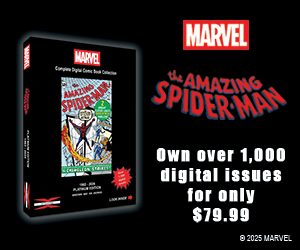Marvel comics in the 1970s!
Click any year below to see more about the hero of the year winners, and to find all the comics we read for each individual year. Or, check out the 1970’s decade recap.
Join via:
Podcast — iTunes, Google Play, Pod Feed
1970
Hero of the Year: Spider-Man
Villain of the Year: Mephisto
Issue of the Year: Amazing Spider-Man #90
1971
Hero of the Year: The Avengers
Villain of the Year: Morbius
Issue of the Year: Amazing Spider-Man #100
1972
Hero of the Year: The Avengers
Villain of the Year: The Sentinels
Issue of the Year: Avengers #104
1973
Hero of the Year: Captain Marvel
Villain of the Year: Green Goblin
Issue of the Year: Amazing Spider-Man #121
1974
Hero of the Year: Captain Marvel
Villain of the Year: Thanos
Issue of the Year: Captain Marvel #33
1975
Hero of the Year: Adam Warlock
Villain of the Year: Thanos
Issue of the Year: Giant-Size X-Men #1
1976
Hero of the Year: X-Men
Villain of the Year: Bullseye
Issue of the Year: Uncanny X-Men #101
1977
Hero of the Year: X-Men
Villain of the Year: Thanos
Issue of the Year: Marvel Preview #11
1978
Hero of the Year: The Avengers
Villain of the Year: Korvac
Issue of the Year: Fantastic Four #200
1979
Hero of the Year: X-Men
Villain of the Year: Proteus
Issue of the Year: Iron Man #128
Heroically Support Comic Book Herald!
If you like Comic Book Herald, and are able to donate, any small contribution will help keep CBH alive and full of new comics guides and content. Donate here! Or, support CBH’s My Marvelous Year on Patreon for exclusive rewards! Thank you for reading!


Hey, can you make comic power rankings for other decades too? Your 1960’s guide for best comics is helping new readers like me a lot. Please consider that for us. Thank you very much
Hey, do you think you’ll have a 1970s comic power ranking like you had for the 60s (see below)? If not, will you make one?
https://www.comicbookherald.com/best-1960s-marvel-comics/
I second this request. As a relatively new fan to the Marvel comic universe, I have found your ’60s guide to be tremendously helpful. I’d love to see a similar ranking with reading orders for the 70s.
Here is a topic for discussion: at what point in the 1970s do we hit the end of the Silver Age?
I think most comic historians agree that the Silver Age started with the revival of The Flash in Showcase #4. And that prompted Marvel to get back into the superhero biz.
We’ve been reading books by the stars of the Silver Age including writer Stan Lee and artists Jack Kirby, Gil Kane, Steve Ditko, Gene Colan, John Buscema, and John Romita, Sr. But now we are moving into the era dominated by the next generation of creators: Denny O’Neil and Neal Adams, Gerry Conway, Barry Smith and Jim Starlin.
So I wonder at what point do we demarcate between the Silver and Bronze?
Is it the advent of Social Relevance? (as we see in the Drug issues of Spider-Man)
The change in art style? (with the more realistic art due to highly influential Neil Adams)
The start of having a Darker Tone? (as exemplified by the Death of Capt. Stacy or another major character)
Or perhaps the rise of number of alternative story types like sword and sorcery, supernatural or horror-oriented titles? (Conan, Dracula, Shanna the She-Devil)
Thoughts?
This is a great question. I think everything you mention certainly plays a role in transitioning from Silver to Bronze Age.
An additional Marvel-focused lens: Jack Kirby’s final issue on Fantastic Four (September 1970). It marks the end of the era to me, and coincides with the darker tone and social issues that become increasingly prominent from that point forward.
Good point. I forgot to put that on the list. It all seems to coincide: creative changes, market changes, stylistic changes. I used to try to pin it on one moment, ala Showcase #4, in this case ASM 121. But maybe there is no one moment. Perhaps it was the combination of all teh factors that leads the change or eras with ASM 121 just being a “climax” that helps mark the pivot point….
just FYI – i think comments are disabled on the 1970 reading list page. either that, or everyone else is just as far behind as i am!
Now open, thanks for the heads up!